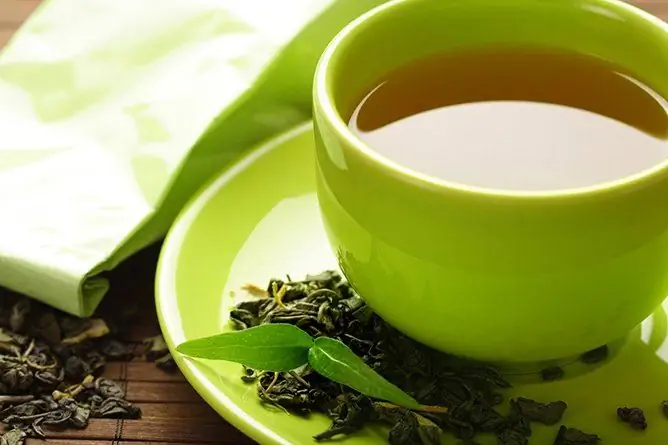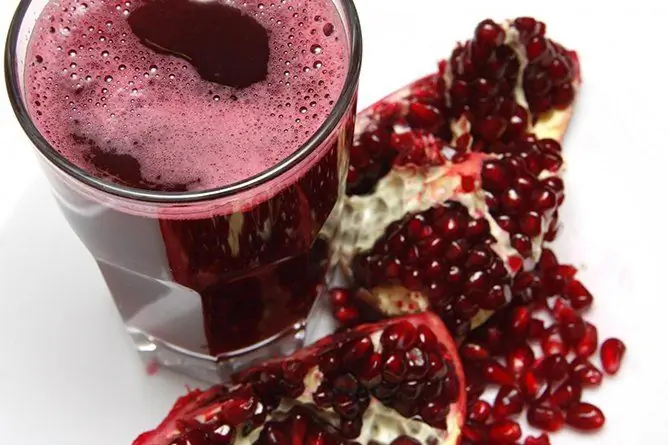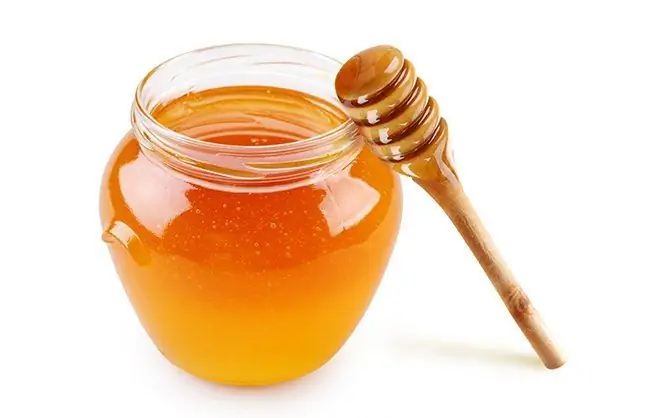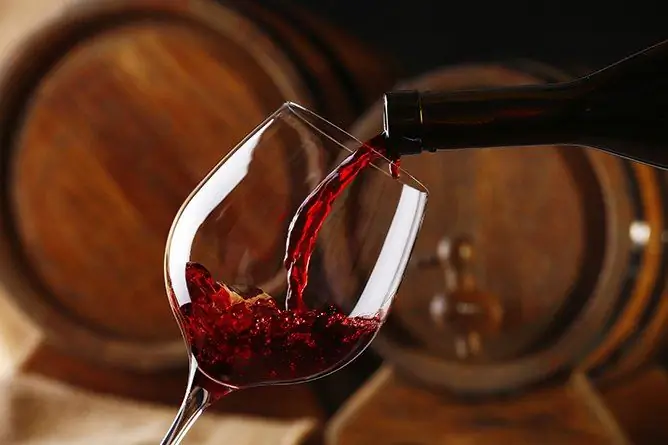- Author Rachel Wainwright wainwright@abchealthonline.com.
- Public 2023-12-15 07:39.
- Last modified 2025-11-02 20:14.
Tea for high blood pressure: which tea lowers blood pressure, and which one increases
The content of the article:
- Green tea for high blood pressure
- Hibiscus tea that lowers blood pressure
- Hawthorn tea
- Herbal teas that lower blood pressure
- Can I drink black tea
- Video
What tea lowers blood pressure, and is it possible to use tea to lower it at all, if it is known that tea has a tonic, that is, a stimulating effect on the body? It turns out that there are teas that can really help with hypertension.
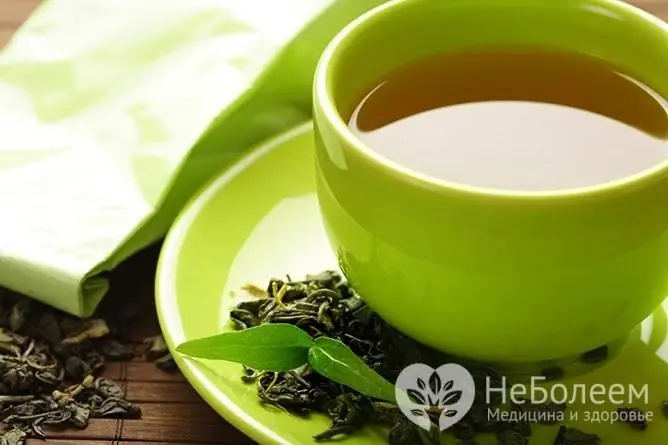
Correctly brewed green tea has blood pressure lowering properties
Green tea for high blood pressure
Correctly brewed green tea has a complex effect on the cardiovascular system, in particular, it is able to effectively reduce pressure due to its sedative effect. This drink contains many useful substances - antioxidants, vitamin C, microelements. Its regular use normalizes metabolism, which is important for hypertension, and phytoncides have a calming effect on the nervous system, reduce heart rate, cause vasodilation - that is, they have a direct antihypertensive effect.
You need to know that green tea also contains caffeine and a number of other substances that increase blood pressure (BP), so it must be brewed correctly. You do not need to make the tea strong and infuse it for a long time, in this case you can get the opposite biological effect, that is, an increase in blood pressure. It will also impair the taste of the drink. To brew healthy, pressure-reducing green tea, take 1/3 teaspoon of the tea in a glass of hot water with a temperature of no more than 85 ° C, infuse for no more than 5 minutes, after which the tea is filtered. High quality green tea can be brewed 2-3 times without loss of properties. Drink it hot or cold, adding ice. You can sweeten the tea with honey, sugar is not recommended.
Hibiscus tea that lowers blood pressure
Hibiscus tea is prepared by brewing dry flowers of hibiscus, or Sudanese rose - a beautiful plant that is used for decorative purposes in Europe. The drink has high taste, being chilled, perfectly quenches thirst in the heat, and for many centuries people have been using it as a remedy. Hibiscus is rich in vitamins - it contains the largest amount of them in comparison with other types of tea. It stimulates the immune system, increasing resistance to infections, improves digestion, produces a mild sedative (calming) effect, and also significantly lowers blood pressure.
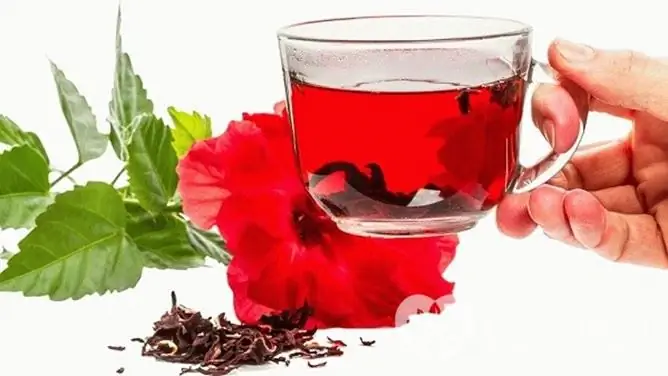
Hibiscus tea has a pronounced antihypertensive effect
In different sources, there is a statement that the temperature of the water during brewing affects the property of hibiscus to lower or increase the pressure. Allegedly, a drink brewed with cold water lowers the pressure, while hot water increases it. In fact, this is not the case, hibiscus tea lowers the pressure with any method of preparation.
Hibiscus can be drunk cold or hot, brewed with boiling water like regular tea, brewed or infused in cold water - this can affect its taste properties, which, however, are perceived individually (someone likes to drink hot hibiscus, someone chilled) but not for antihypertensive drugs.
Hawthorn tea
Hawthorn is a plant that is unique in its chemical composition and has many useful properties. In large quantities, it contains antioxidants that neutralize harmful metabolites that are formed in the body. Free radicals damage cells, including acting on the walls of blood vessels, due to which the vessels lose their elasticity and the ability to compensate for a strong heart beat. This is what is most often the cause of hypertension. Antioxidants are substances that neutralize free radicals.
The phytoncides found in hawthorns stimulate inhibitory processes in the central nervous system and thus have a calming effect. At the same time, the heart rate also decreases, and blood vessels expand, blood circulation improves, and cerebral circulation improves. For these reasons, hawthorn preparations are recommended for older people.
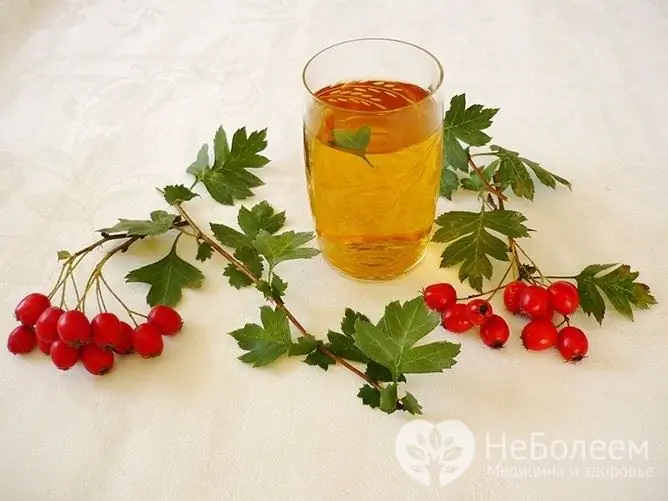
Hawthorn tea not only lowers blood pressure, but also has a number of beneficial properties.
Both the leaves of the plant and its fruits can be used to make pressure-reducing tea, but tea made from fruits has a more pleasant, rich taste. A tablespoon of dry raw materials is brewed in a thermos with ½ liter of boiling water and infused for 30 to 60 minutes. Then the liquid is filtered off and drunk, divided into 2-3 doses.
Herbal teas that lower blood pressure
Many herbs used in herbal teas have a stabilizing effect on the cardiovascular system and lower blood pressure. One of the most popular teas with this effect is mint.
Mint is a medicinal plant, its infusion has anti-inflammatory, analgesic, pronounced sedative effect. Menthol, which is the active ingredient in mint, dilates blood vessels, in particular the coronary arteries of the heart, improving blood circulation in the heart muscle, which serves as the prevention of coronary heart disease and myocardial infarction.
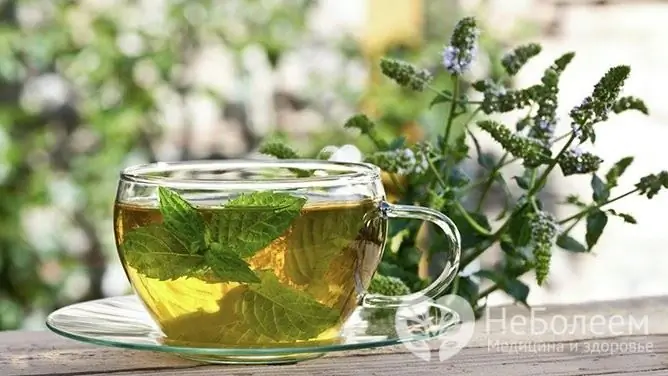
Mint tea is useful for hypertensive patients, as it dilates blood vessels
Mint tea is prepared as follows: 4-5 medium leaves are poured with boiling water and infused for 5-10 minutes, after which the drink is ready for use.
Tea made from leaves of motherwort, lemon balm, strawberry, rose hips, valerian has antihypertensive properties.
Can I drink black tea
Traditional for our region is not green or herbal, but black tea, in connection with which the question is relevant - is it possible to drink tea at high pressure?
Black tea is a healthy drink, rich in trace elements, phytoncides and vitamin C, but it is not suitable for hypertensive patients - even being a weak brew, it contains a lot of caffeine, which causes a narrowing of the vascular lumen and an increase in blood pressure. The action of caffeine in black tea is mitigated by theobromine and theophylline in its composition, which, unlike caffeine, dilate blood vessels, produce a diuretic effect and thereby somewhat lower blood pressure - which is why black tea has a less exciting effect on the nervous system than coffee. However, it is a tonic drink that people prone to hypertension should consume in moderation and not at all for high blood pressure.
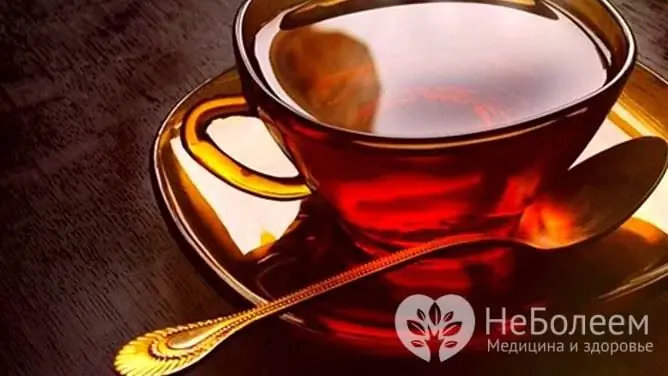
Despite its many beneficial properties, black tea is not recommended for hypertension.
Some people believe that the tonic effect of tea is neutralized by milk, and if you drink tea with milk, then it will have a lowering rather than increasing effect of pressure. This is not true. The addition of milk (as well as lemon, jasmine, etc.) does not affect the blood pressure-raising property of black tea.
Video
We offer for viewing a video on the topic of the article.

Nikita Gaidukov About the author
Education: 4th year student of the Faculty of Medicine No. 1, specializing in General Medicine, Vinnitsa National Medical University. N. I. Pirogov.
Work experience: Nurse of the cardiology department of the Tyachiv Regional Hospital No. 1, geneticist / molecular biologist in the Polymerase Chain Reaction Laboratory at VNMU named after N. I. Pirogov.
Found a mistake in the text? Select it and press Ctrl + Enter.

